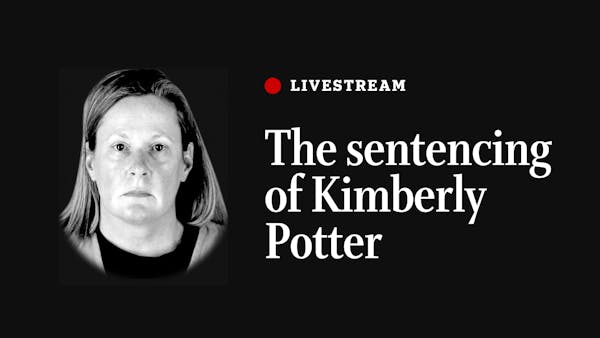The third day of jury deliberations in downtown Minneapolis ended without verdicts Wednesday in Kimberly Potter's manslaughter trial for shooting Daunte Wright last spring.
The jurors had no questions and gave no communication to the court Wednesday as they ended a total of 24 hours in deliberations since being handed the case early Monday afternoon.
Potter, a former Brooklyn Center police officer, is charged with first- and second-degree manslaughter for shooting Wright, 20, with her handgun as he resisted arrest during an April 11 traffic stop. She has maintained that she meant to deploy her Taser.
The sequestered jurors reconvened Wednesday at 8:25 a.m. and finished their deliberations at 6 p.m. It's unknown whether they have been deliberating through their lunch break. Judge Regina Chu has said that if the case continues into the holiday weekend, she will give jurors Friday and the weekend off.
Outside the Hennepin County Government Center, where the trial is being held, activist Brandyn Tulloch said to a crowd of 50 protesters, "What is taking so long? We all saw the video. We all saw her reaction to what she did."
Tulloch said Potter wasn't crying in the body cam footage because she killed a young Black man. "She was crying because she knew, mistake or not, she knew what she did and the consequences she should face," Tulloch said.
Jonathan McClellan, an activist with the Minnesota Justice Coalition, acknowledged being "a little anxious" about the lack of a verdict on either count. He said he was concerned that the bias of the largely white jury might be preventing Potter from being convicted.
"It's a no-brainer," he said. "There should be a conviction on both counts."
A portion of the City Center shopping mall along S. 7th Street was boarded up Wednesday evening while the dozen block stretch of Nicollet Mall appeared unfazed by the ongoing jury deliberation and potential unrest from a not guilty verdict.
Places hit hard during riots last year after the death of George Floyd in police custody, such as Brit's Pub, Target and Nordstrom Rack, were all open to customers and free of plywood.
Late Tuesday afternoon, the jury presented two questions to Chu, and they were heard in open court with all the attorneys and Potter present.
The jurors' first asked Chu, "If the jury cannot reach consensus, what is the guidance around how long and what steps should be taken?"
Chu read again an excerpt from the jury instructions she read to the group Monday before they began deliberating.
"You should discuss the case with one another and deliberate with a view toward reaching agreement if you can do so without violating your individual judgment," Chu said. "You should decide the case for yourself but only after you have discussed the case with your fellow jurors and have carefully considered their views. You should not hesitate to re-examine your views and change your opinion if you become convinced they are erroneous, but you should not surrender your honest opinion simply because other jurors disagree or merely to reach a verdict."
The other question had to do with removing zip ties securing Potter's gun to a cardboard box so they could better handle the unloaded weapon. Chu instructed the jurors to ask a sheriff's deputy guarding their deliberations to remove the zip ties, and then to have the deputy re-secure the gun with zip ties after they were finished handling it.
Prosecutors at trial meticulously walked through the differences between Potter's Taser and handgun, noting that the gun weighed twice as much as the Taser, and strongly urged jurors to feel those differences during deliberations. The defense has argued that she meant to use her Taser but shot Wright once in the chest with her gun.
Potter's attorneys, Paul Engh and Earl Gray, objected to Chu reading the excerpt of the jury instructions, saying they are meant to be considered as a whole. They also said the gun should not be removed and should remain in its case for "safety purposes." Chu overruled the defense's objections.
Most juries in the trials of other Minnesota officers charged with killing civilians on the job have returned verdicts quickly.
Jurors in April convicted former Minneapolis police officer Derek Chauvin of murdering George Floyd in nine hours spread over two days. Jurors in 2020 took a day to acquit Washington County sheriff's deputy Brian Krook of killing Benjamin Evans. In 2019, jurors convicted former Minneapolis police officer Mohamed Noor of killing Justine Ruszczyk Damond after about 10 hours of deliberations over two days.
The exception is former St. Anthony police officer Jeronimo Yanez, who was acquitted in 2017 of killing Philando Castile. Jurors deliberated for 30 hours over five days in that case.
A similar roadblock occurred during Yanez's trial. After 2 ½ days of deadlocked deliberations, jurors in his case asked Ramsey County District Judge William H. Leary III for guidance. Leary read them the identical instruction that Chu gave Potter's jury. Two days later, Yanez's jury returned not guilty verdicts on all counts.
Potter, who is white, shot Wright, who is Black, immediately after yelling, "Taser! Taser! Taser!" She then said she had used the wrong weapon. The shooting and aftermath were captured on multiple police body cameras.
Nine of the jurors are white, two are Asian women and one is a Black woman. Four jurors are in their 40s, three are in their 20s, two are in their 60s, two are in their 50s and one is in her 30s.
Star Tribune staff writers Kim Hyatt and Randy Furst contributed to this report.

Want to share info with the Star Tribune? How to do it securely

'Safe recovery sites' would offer syringes, naloxone and more to people using drugs. The plan could be in peril.
New Minnesota GOP leaders seek peace with party's anti-establishment wing

Who is Republican Lisa Demuth, Minnesota's first House speaker of color?

